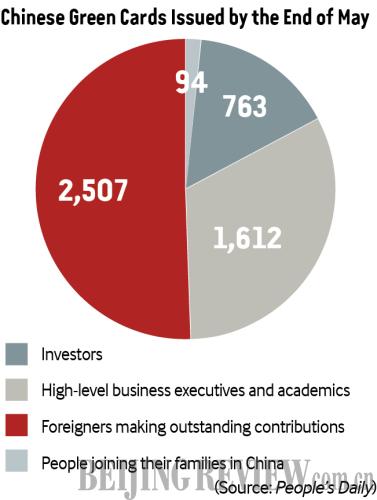|
Lower bar needed
"When the Regulations on Examination and Approval of Permanent Residence for Foreigners were drafted, the policy leaned toward prudence based on two factors: China has a large native population and a comparatively small expatriate population," said Wang Zhenyao, Director of the Beijing-based Center for China and Globalization.
Today, the situation is changing rapidly as more and more foreign nationals come to study or work in China. The population of long-term foreign residents in China increased from around 230,000 in 2003 to nearly 500,000 in 2010.
Wang commented that after the global financial crisis in 2008, more and more foreigners have come to China to seek job opportunities or start businesses, which has driven up the population of foreigners living in China as well as the demand for permanent residence permits.
Wang believes the government's programs to lure professionals from overseas are far from enough to satisfy the demand for talented foreign manpower. He suggested that permanent residence permits cover a larger group of foreigners.
According to Wang, the Chinese residence permit system puts too much emphasis on applicants' professional titles and working experience in China compared with the systems in Western countries, which mainly evaluate applicants' academic background, language skills and working experience in their countries of origin.
China is facing a growing talent deficit as a large number of people emigrate abroad every year.
In 2012 alone, more than 150,000 Chinese people obtained permanent residence status in the United States, Canada, Australia and New Zealand, which are the top four destinations of emigrants from China.
In his essay in the International Herald Leader, Wang wrote that Chinese emigrants today are mostly between 35 and 55 years old, belong to the middle and affluent classes and enjoy great influence in social affairs. "The exodus of middle-class elites has exerted incalculable losses on China's reforms and social progress," Wang said.
Professor Xiao Mingzheng at the School of Governance of Peking University was on the drafting panel of China's National Medium- and Long-term Talent Development Plan (2010-20), which was released in 2010 as China's blueprint for creating a highly skilled workforce within the next 10 years. He said that China occupies an upper-middle position in the international competition to attract high-level human resources.
"While developed countries excel with their advanced social development and clean natural environment, China's biggest advantage lies in the promising development space it provides for talented people with its rapid socioeconomic development," Xiao said.
Email us at: lili@bjreview.com
Requirements for a Permanent Residence Permit
Investors:
- Have made direct and stable investment in China for three consecutive years, with a sound taxation record;
- Investment totaling more than $500,000 in industries where foreign investment is encouraged by the government or in western areas or poverty-stricken counties; more than $1 million in central areas; or more than $2 million in the whole country.
High-level Executives and Academics:
- Have assumed the posts of vice general manager, deputy director and above—or associate professors, associate research fellows and similar posts—for more than four years in a row, with an accumulated period of stay no shorter than three years and a sound taxation record;
- Employed by institutions subordinate to ministerial departments under the State Council, China's cabinet, or to provincial governments; major higher learning institutions; or companies undertaking a key national project or research program, hi-tech companies, companies in industries where foreign investment is encouraged by the government, companies possessing advanced technologies or export-oriented foreign companies.
(Source: Regulations on Examination and Approval of Permanent Residence for Foreigners)

| 